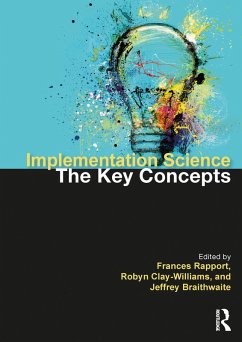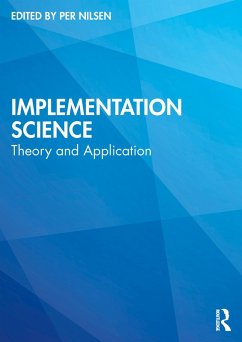
Implementation Science (eBook, PDF)
The Key Concepts
Redaktion: Rapport, Frances; Braithwaite, Jeffrey; Clay-Williams, Robyn
Versandkostenfrei!
Sofort per Download lieferbar
36,95 €
inkl. MwSt.
Weitere Ausgaben:

PAYBACK Punkte
18 °P sammeln!
This accessible textbook introduces a wide spectrum of ideas, approaches, and examples that make up the emerging field of implementation science, including implementation theory, processes and methods, data collection and analysis, brokering interest on the ground, and sustainable implementation.Containing over 60 concise essays, each addressing the thorny problem of how we can make care more evidence-informed, this book looks at how implementation science should be defined, how it can be conducted, and how it is assessed. It offers vital insight into how research findings that are derived fro...
This accessible textbook introduces a wide spectrum of ideas, approaches, and examples that make up the emerging field of implementation science, including implementation theory, processes and methods, data collection and analysis, brokering interest on the ground, and sustainable implementation.
Containing over 60 concise essays, each addressing the thorny problem of how we can make care more evidence-informed, this book looks at how implementation science should be defined, how it can be conducted, and how it is assessed. It offers vital insight into how research findings that are derived from healthcare contexts can help make sense of service delivery and patient encounters. Each entry concentrates on an important concept and examines the idea's evidence base, root causes and effects, ideas and applications, and methodologies and methods. Revealing a very human side to caregiving, but also tackling its more complex and technological aspects, the contributors draw on real-life healthcare examples to look both at why things go right in introducing a new intervention and at what can go wrong. Implementation Science: The Key Concepts provides a toolbox of rich, contemporary thought from leading international thinkers, clearly and succinctly delivered.
This comprehensive and enlightening range of ideas and examples brought together in one place is essential reading for all students, researchers, and practitioners with an interest in translating knowledge into practice in healthcare.
Containing over 60 concise essays, each addressing the thorny problem of how we can make care more evidence-informed, this book looks at how implementation science should be defined, how it can be conducted, and how it is assessed. It offers vital insight into how research findings that are derived from healthcare contexts can help make sense of service delivery and patient encounters. Each entry concentrates on an important concept and examines the idea's evidence base, root causes and effects, ideas and applications, and methodologies and methods. Revealing a very human side to caregiving, but also tackling its more complex and technological aspects, the contributors draw on real-life healthcare examples to look both at why things go right in introducing a new intervention and at what can go wrong. Implementation Science: The Key Concepts provides a toolbox of rich, contemporary thought from leading international thinkers, clearly and succinctly delivered.
This comprehensive and enlightening range of ideas and examples brought together in one place is essential reading for all students, researchers, and practitioners with an interest in translating knowledge into practice in healthcare.
Dieser Download kann aus rechtlichen Gründen nur mit Rechnungsadresse in A, B, BG, CY, CZ, D, DK, EW, E, FIN, F, GR, HR, H, IRL, I, LT, L, LR, M, NL, PL, P, R, S, SLO, SK ausgeliefert werden.













